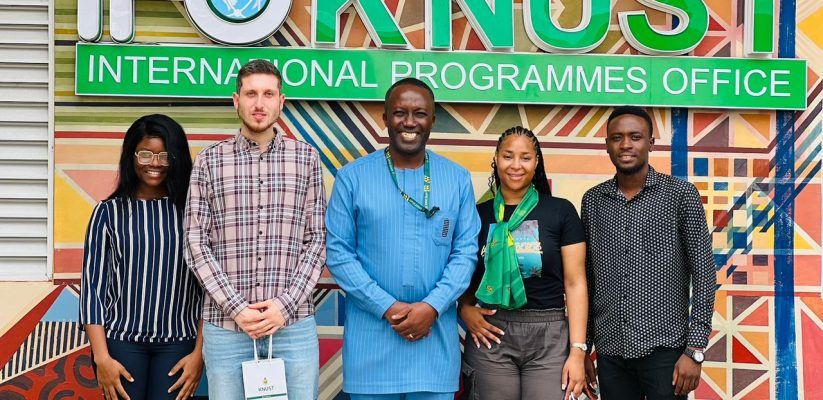By Georgi Kostakev (BSc in Pharmacology & Physiology)
Ghana – A Taste of History, Culture, and Hospitality
Ghana was the first African country to be liberated from colonialism, making it a beacon of hope in West Africa. Steeped in a rich tapestry of history, culture, and natural beauty. In this vibrant environment, I embarked on a six-week clinical laboratory placement – part of a summer exchange program at the Kwame Nkrumah University of Science and Technology (KNUST) in Kumasi. Named after Kwame Nkrumah, Ghana’s first president and a champion of independence, KNUST is a leading hub of scientific and technological research.

Haematology – The Lifeblood of Medical Science
My first three weeks were spent at the Komfo Anokye Teaching Hospital (KATH), specifically in the Haematology lab at A&E. Here, I delved into the study of blood, performing a variety of tests to detect abnormalities in the human body. I became familiar with tropical diseases, such as malaria, and learned to identify different species of malaria parasites. I also performed Sickle cell electrophoresis, a crucial test in diagnosing Sickle cell disease, and conducted complete blood count (CBC) tests. I had the opportunity to enter patient data into the medical system and report to the medical personnels. I enjoyed this because I had always dreamed of working in a clinical setting in Africa, and I thoroughly enjoyed my introduction to this first-hand experience.

Histopathology – A Journey Through the Human Body
The next three weeks were spent in the Pathology department, specifically the Histopathology laboratory. Here, I participated in the entire process of handling specimens, from their arrival at the lab to the final microscopy performed by the pathologists. I had the opportunity to go through the complex process of preparing specimens for microscopy, from grossing to embedding and sectioning. This experience was further enhanced by the opportunity to be part of several autopsies, which deepened my understanding of human physiology and anatomy. I had the opportunity to handle and dissect body organs. Although initially, I found this a bit disturbing in the beginning the lead Doctors were welcoming and gave me good guidance which made me feel supported and truly immersed in the team.



Parasitology – Exploring the Microscopic World
My journey through the scientific field continued in the Parasitology laboratory, where I learned to perform urine and faecal tests and recognise different cell types and parasites under a microscope. This hands-on experience significantly enhanced my practical skills and broadened my understanding of tropical diseases caused by microscopic parasites.



Cultural Exploration – Unveiling the Heart of Ghana
Beyond the borders of the lab, I embarked on a cultural journey across Ghana. In Accra, the energetic capital, I visited the Independence Square, Kwame Nkrumah Memorial Park and Museum, soaking in the rich history of Ghana. The vibrant nightlife of Accra, with its lively music and dance, provided a taste of Ghana’s present culture. I visited the historical Cape Coast and Elmina, where I made some unforgettable memories. I had the opportunity to visit Kakum National Park where I had a great adventure in nature on the Canopy Walkways.

Embracing the Ashanti Culture
In Kumasi, the heart of the Ashanti Region, I was surrounded by the rich culture and warm hospitality of the locals. I visited local museums and the cultural centre of the Ashanti Kingdom, a witness to the region’s royal heritage. Kwasi Junior is a student and now my friend from KNUST accepted for a semester-long exchange at the University of Westminster. He took me with his friends on a trip to Bomfobiri Wildlife Sanctuary, where I experienced the diverse wildlife and stunning waterfalls – a true spectacle of Ghana’s natural beauty.



The Culinary Delights of Ghana
The local cuisine was a culinary adventure I’d never experienced before. Traditional dishes like Fufu with light goat soup, served in communal bowls and eaten with hands, offered a unique dining experience. The Ghanaian jollof rice, a one-pot dish with a medley of flavours, and Banku, a local staple made from fermented corn and cassava dough, were culinary delights. The freshness of the tropical fruits and the natural products like shea butter and coconut oil added to the richness of Ghanaian cuisine.

The Enchanting Landscapes and Climate of Ghana
Despite the rainy season, the weather was mostly dry and hot with high humidity. The occasional night thunderstorms added a dramatic touch to the African landscape. The African sun, with its brilliant glow, was a constant companion, casting a golden hue on everything and making the skin radiate with a healthy glow.
Conclusion – An Unforgettable Journey
This six-week clinical laboratory placement was not just an academic endeavour; it was a journey of personal growth, cultural immersion, and a deeper understanding of the world beyond my immediate environment. The placement has enhanced my employability skills, equipping me with practical experience and a broader perspective on healthcare. It has also underscored the importance of cultural sensitivity in healthcare, a valuable lesson I will carry forward in my future endeavours.
From the dynamic labs at KATH to the vibrant life of Kumasi, from the historical sites in Accra to the lush landscapes of Cape Coast and Elmina, each moment in Ghana was a step in my journey of growth and discovery. This experience was a testament to the power of experiential learning and cross-cultural exchange, a journey that I will cherish forever.
- Working with Earth Heir as part of the Global Futures Programme, KL - November 14, 2025
- My Ghana Summer Placement - December 20, 2024
- Gaining Confidence and Broadening my Perspectives at HKBU Summer Programme - November 25, 2024
